Text
Love how tumblr has its own folk stories. Yeah the God of Arepo we’ve all heard the story and we all still cry about it. Yeah that one about the woman locked up for centuries finally getting free. That one about the witch who would marry anyone who could get her house key from her cat and it’s revealed she IS the cat after the narrator befriends the cat.
312K notes
·
View notes
Text
Asian Honorifics & BL - a quick & dirty guide, with examples
You ready for another one of my long broad brush linguistics in BL posts? (As always check the comments for people better than me correcting or adding content. Also I will be updating this post as long as Tumblr lets me fiddle with it.)
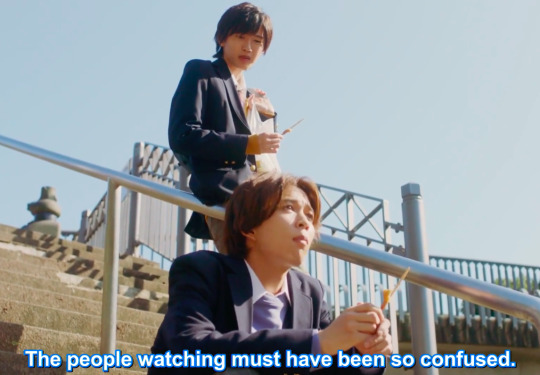
Codicil: I’m a dilettante who loves the cultural side of linguistics, and loves to help people understand BL better via language. I attempt to explain things using very simplistic terms and an anthropological approach, I am aware that it’s a lot more complicated. But I’m doing my best.
Codicil 2: This is meant to help BL watchers, not to guide tourists who in intend to travel to these countries.
Honorifics in General - the concept
Honorifics = a title or word implying or expressing status, politeness, or respect.
Many Asian languages employ honorifics in a filial manner (distinguishing status along generational lines with regards to birth year, professional relationship, and parental state). Basically calling someone who is NOT an actual blood relation “older brother” (e.g. Korean hyung or oppa) or “younger sibling” (e.g. Thai nong), or auntie (see many Indian or Latin American cultures). These can also be a kind of endearment in romantic relationships.
The closest most westerns can think of this is that the honorific is used as a way to delineate an intimate relationship/friendship across an age gap, but its implications are not always intimacy. (Except when they very much are, see oppa.)
You may be familiar with a phrases like “we’re so close she’s like my sister” or “he’s like a brother to me.”
However, because most westerners exist in relationships to peers only under the broad umbrella term friend, we will only use “like my sister” or “basically my brother” when someone is particularly dear to us but not sexually.
In most Asian languages, honorifics are more codified. So there is a status conferred by age which dictates honorifics be used. They’re mandatory for communication. Intimacy levels between individuals CAN impact this, but are not the primary decider on what honorific is used under most circumstances. Position in society is.
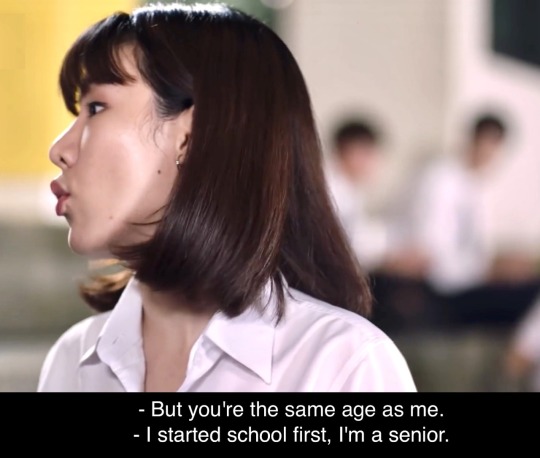
So these terms are often defined (or even translated) with sibling language. See early Thai BLs translate phi as bro, but that’s not strictly correct.
There are also often honorifics for larger age gaps (so more like auntie or uncle, delineating relationships like adult neighbors or a friend’s parents, or parents’ friends).
And there are honorifics for people in authority positions (like doctors, teachers, bosses) who are usually older (but not always). These honorifics are employed in the arenas of education, hobby activities (like ceramic classes or martial arts) and the workplace.
For many, informality of older to younger will be characterized by use of casual (or rude) language and lack of honorifics (from the older person to the younger one). So the older character will have one mode of address and way of talking, while the younger character exists in a more formal register when they are speaking back to someone older.
In other words, an older person can speak informally to a younger one, but not the reverse. (Yaja time excepted…)

Complexity of Honorifics as Elements of Language
Honorifics can function as titles:
Honorifics can be translated as/like titles. This is is the kind of thing we are most familiar with: Mister, Mrs, Mz, Miss, Master, Mistress, Sir, Madam, Ma’am are all, technically, honorifics. So are certain forms of address and royal titles, “The honorable” for example. Anything you might put in front of a name to add formality in English probubly qualifies as an honorific.
Honorifics can function as pronouns:
Or modes of address. For example the title boss, in English can also be used to call or refer to someone directly. “Hi, boss!” or “my boss” or “the boss says.” Honorifics serve the same function. In this way they can become pronouns. You can, in Korean, just call someone “hyung” it acts as the you pronoun for direct address. And often they can also be used in the 3rd person. So my “hyung” did such and such. This is why hyung = brother in a lot of translations. Because English uses brother in much the same way, it can act as both a 2nd or 3rd person pronoun. (Rarely first, but that’s an issue with English, that our first person pronoun is so inflexible.)
In Thai you can refer to a friend as phi (you pronoun in direct address, or use it as a she/he/they pronoun in third person) or you may refer to yourself as phi (using it as an I pronoun). In other words, phi can entirely replace a person’s name in all linguistic uses.
He/She/They goes to the store = phi goes to the store (when talking about my older friend to someone else)
I go to the store = phi go to the store (when talking to a younger person about my own actions), and
you go to the store = phi go to the sore (when talking to an older friend about something they are going to do - direct address)
Honorifics are also suffixes:
In Korean and Japanese honorifics are also attached to names in the form of suffixes. See the Japanese section. (Also sometimes prefixes, argh.)
Honoring is also attached to particles:
In Thai, polite particles confer respect levels as well, which means they also contain within them certain aspects of status and honorifics. See the Thai section.
The best way to understand honorifics in BL is by example.
Ready?

Korean - Honorific titles: Hyung, Noona, Oppa & Beyond
I’m starting with Korean because it is the most spoken and understood by westerners these days. I can only address this as a layperson who watches too many Kdramas.
Korean names in brief:
In Korea names are said family name first (what we call surname or last name) and then given name second (what we would call first name). Usually the family name is single barreled or one syllable, but the given name is double barreled or two syllables. So: Chu Sang Woo = Chu (family name) Sang Woo (given name, always said together). This is why I will usually refer to BL characters by their first name as a combo, e.g. SangWoo. In formal address, however is would be Chu SangWoo-ssi. Usually the entire name is said (see comments). Even when JaeYoung is being rude he usually says “Chu SangWoo.”
Korean honorifics you’ll hear:
Hyung | hyeong 형 - is said by a younger male when addressing an older male. I will use the term Hyung Romances for BLs that feature a younger seme pursing and older uke because…
Noona | nuna 누나 - is said by a younger male when addressing an older female and is responsible for the accepted series category “Noona romances” which are dramas that feature a younger boy pursuing an older woman.
Oppa 오빠 - is said by a younger female when addressing an older male. Also used by girlfriends addressing their boyfriends, or wanna-be boyfriends. Under a romantic context oppa is considered somewhat cringe/cheesy/cutsie.
Unni | eonni 언니 - is said by a younger female when addressing an older female.
Sunbae | seonbae 선배 - is said by a younger person to an older person (gender neutral) and is more formal. It can be used in the workplace and it mostly about seniority and less familial.
Hoobae | hubae 후배 - is said to/of a younger person, either across a generational gap, or within a workspace environment, again this one is about seniority and less familial.*
Although an older person’s filial and social responsibility to a youngster is always in play.
In Kpop you’ll hear sunbae used a lot by younger (say 4th gen) groups when referring to older groups within the industry. Or when talking about Kpop idols who they don’t personally know (or are so big they’re nervous about any assumption of intimacy). On reality shows like Queendom or Kingdom it’s particularly telling. Some of the funniest moments of Kingdom Legendary Wars is any time Penal (an American from BTOB - an older v established group) tries to convince the youngsters, some of them 10 years his juniors, to use casual language (drop honorifics). The poor things get SO confused.
BL Deeper Meanings behind Hyung
Okay so the best show to watch for this one is Semantic Error.

SangWoo starts out calling JaeYoung sunbae and rarely goes less formal. Technically sunbae is polite, but also slightly insulting in a university narrative of this type. Let me try to explain. Because as they become more intimate, combative or not, friends or frenemies, SangWoo should switch to using hyung, but he pointedly does NOT.
JaeYoung, on the other hand, always uses extremely informal (to the point of rude) language with SangWoo. (Culturally, he allowed such informality as he is SangWoo’s senior both at university, and in age). But you can watch him get annoyed that SangWoo insists on sticking to sunbae, to the point where he demands SangWoo use hyung.
Then after that, anytime SangWoo does use hyung JaeYoung totally melts for it, because it was hard fought and won, and it means something powerful and significant is shifting in their intimacy as a result.

During the mutual kissing at the bar scene, Semantic Error drops yaja time on us. Yaja time is a sanctified reversal of honorifics that essentially allows for a younger person to speak their mind informally and without repercussions (or supposedly so). It’s a kind of way to flirt and tease, but also somewhat taboo and titillating as a game to play when tipsy. You get yaja time in bars/clubs sometimes, like happy hour. If you watch the final episode of Kpop reality show I-land you’ll see a real word example of yaja time in action amongst the contestants, it’s adorable and very funny.
Semantic Error uses yaja time as an opportunity for drunk SangWoo to finally talk about his real feelings, without the pressure of linguistic formality.
They also use it for JaeYoung to drop the sluttiest most flirtatious hyungs in the history of all hyunging. Seriously, the boy is dripping seduction with that one world. Why? Because HE CAN. He is making the formality itself a kind of kink.

You can watch these two on the promo circuit attempt yaja time and even though they have an easy brotherly relationship, you can still see how uncomfortable it makes Jae Chan in particular.
Other honorific play in Semantic Error:
The girl who is interested in dating SangWoo calls him oppa, and ALSO requests to use a nickname+oppa with him (the nickname means lettuce). That is pretty blatant flirting. But note she specifically asks if she is allowed to do so?
Later when JaeYoung confronts her and stakes his claim, notice the thing he really wants corrected is her language with SangWoo? He wants her to go all the way beyond sunbae to formality by using the honorific suffix 씨 (ssi). But there’s also more lettuce wordplay here (I think) because he isn’t insisting she use SangWoo’s full name.
“You should call him Chu-ssi” which is translated into English as “Mr Chu.”

A word on oppa and queerness.
Because the implication is that the person saying oppa is female, you will rarely hear boys use this term for their boyfriends (even if they are out gay, unless they are femme and/or cultivating the association for a very specific and culturally subversive of kinky reason).
Exception: non native speakers who are happy to fart around with us and the Korean social structure. So early on, NCT’s (Kpop monster group) Mark (Canadian) would refer to Yuta (Japanese) as oppa. I’m not gonna unpack their relationship, but trust me when I say, no native Korean idol would have ever done this, not right now in Korea’s current social state. Well… maybe Holland but that’s a whole other discussion.
To complicate matters Korean also uses honorific suffixes, but I’m not gonna go into them here. (Read more about Korean honorifics.)
Instead I’m gonna use Japanese to talk honorific suffixes. Ready?
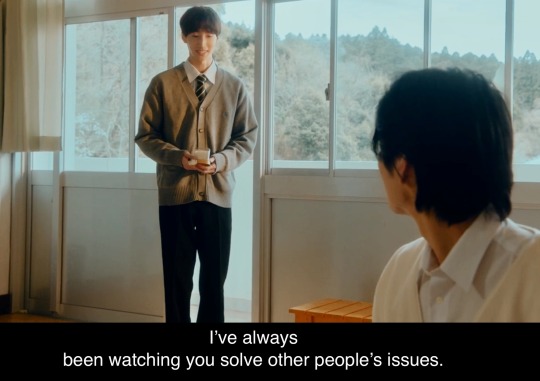
Japanese - Names & Honorifics: suffixes & titles
Like Korean, Japanese uses both suffixes and title honorifics. But I find the suffixes much easier to hear in Japanese than Korean, probubly because I’ve more experience with the language.
Note: As a foreigner in Japan I’ve alway found it best/easiest to refer to someone using surname-san.
Japanese names in brief:
Names are said family name first and then given name. But actually, given names are rarely, if ever, said AT ALL (after an initial introduction).
In BL dramas almost all character’s names and everyday use name will be the family name. (Children are different, but not many of those in JBL.) Teachers may refer to their students by given name-kun.
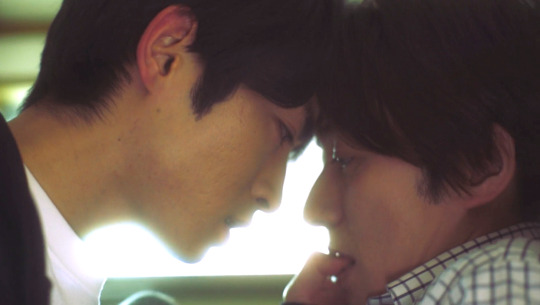
So in Old Fashion Cupcake Togawa is his family name (not given name). Nozue (also a surname) who is both older and Togawa’s boss, refers to Togawa simply as Togawa, with no honorifics, probubly because they are both adult characters and have been coworkers for so long, Togawa-kun would be… odd.
Togawa on the other hand, ALWAYS refers to Nozue as Nozue-san. Even in times of EXTREME intimacy the honorific -san is ALWAYS used.
We have no idea what the given names are for these characters because we never got to that point of intimacy in their relationship. In Japanese romances the given name is usually the ultimate intimacy and is not exchanged until well into a relationship, sometimes after sex or even after marriage. You can watch the delicate maneuvering around this aspect of intimacy in the kinky het drama Sweat & Soap (it’s not BL, but I still love it, on Viki.)
Japanese Suffixes you hear the most in BL:
-chan = is intimate and cute for children, or amongst female friends, or female family/intimates (like your grandma)
-kun = is for respected juniors, younger or junior co-workers, or young boys, and amongst friends
-san = is formal/polite and for general use, amongst friends, equals, strangers, and acquaintances
The best BL to watch to hear all three of these in constant use is Minato’s Laundromat.

Shin always calls Minato, Minato-san and gets very annoyed when anyone doesn’t do this who should (he want’s his man properly respected). Note that he puts Minato-san into his phone as Akira, tho… daring boy.
Asuka calls Minato: Akira-san, which he shouldn’t as a kid a generation younger than Minato. He gets away with it because he and Minato are from the same neighborhood and have similar open, friendly natures.
Minato, on the other hand, struggles with what to call Shin. Technically he should use Katsuki-kun or even Katsuki-chan (which is what he uses on Shin’s sister). Which is Shin’s surname + the suffix for a junior. But Minato is a causal person, so he never bothered with a suffix even at first. Now, informal language is fine from an older person to a younger one, if they have the right personality. But under BL circumstances, Minato’s lack of honorifics kind of gave Shin license to flirt. The moment Minato asked if he could use the nickname Shin he was a goner.
As Shin becomes more aggressive in his pursuit, Minato hops desperately between different suffixes to try to control the situation:
Shin (informal and friendly),
Shin-chan (diminutive, under this context = somewhat demeaning, considering what Shin wants from him), Minato is intentionally lowering Shin’s status and emphasizing his youth when he applies -chan,
Shin-kun (when he thinks Shin is mad at him, or in public, or when he is annoyed and wants to add formality and distance)
I talk quite a bit about this in my squee watch of this series.
Putting someone who should be (or is usually) address by one combo of name (first or last) + suffix into another, by changing either the name of the suffix or both, always has narrative significance for character development or plot or both in Japanese romances. Which is why you get more from the story if you train your ear to listen for these.

In the picture above, Takara is using -san for sarcasm and to gently chide Amagi. Usually he just uses Amagi with no honorific (they are the same age, and he is a curt characters) or Amagi-kun in public of for call/response address. He has moved to a higher level of formality for emphasis and to make a point in this scene. Communicating properly and avoiding conflict is a hallmark of his character, also (as the seme) he wants to control Amagi. This is all wrapped up in that personality and attitude. He is being teasing and sarcastic, but he is also stressing that this dialogue is important to him.
Read more on Japanese honorific suffixes here.
Japanese honorific titles you hear the most in BL:
Senpai (先輩、せんぱい) - senior colleague or classmate, roughly equivalent to the Korean sunbae or Thai phi
Sensei (先生、せんせい) - refers to teachers as well as people who are experts in their respective fields, like doctors, artists, professors, martial arts instructors, or lawyers
The best BL to watch for use of honorific titles in Japanese is… bet you thought I wasn’t gonna manage to shoehorn it in…. Seven Days!
*insert wild cheering*
Sereyo (younger) seems to relish and very much enjoy and flirt by using the honorific senpai with Yuzuru. It’s hard to explain, but the way Sereyo says “senpai” whenever they meet is very very… cute.
You can hear these characters use sensei when in archery practice. And you can hear use of some family suffixes and honorifics since we follow both characters back to their respective homes.

Sereyo calls Yuzuru, Yuzuru-san, which is Yuzuru’s GIVEN NAME + the honorific. This is unexpected because Yuzuru is his senior. He should call him by his surname + honorific: Shino-san.
But Sereyo has an issue, which is that Yuzuru has the same last name as his ex-girlfriend, who was also older. So in his previous relationship, Sereyo called his lover: Shino-san, and he doesn’t want to use the same exact name with his new lover, Yuzuru. So despite Yuzuru being his senior, he asks to use Yuzuru’s first name as a mode of address. Yuzuru being the kind of casual blunt personality he is, doesn’t mind the inherent informality and permits this right away.
More on Japanese honorifics here.
Mandarin Chinese Honorifics

Ho boy am I not going to climb into this one. But I will point out that to confuse matters many Chinese honorifics are actually also blood relation titles - 哥 ge (older brother) 弟 di (younger brother) - (like phi/nong, par/ar, hia/jay in Thai). In other words, the honorific actually is both brother (honorable title) and brother (actual word) AND will be applied to cousins. As in: the word for cousin is ALSO the same word as brother.
In Thai to clear up this relationship a character will often have to state it blatantly: “my real actual older bother, by blood, and not an older male friend” (since phi means both) and not a lover. See this grappled with as a jealously plot point in Star in My Mind.
But in some Chinese BLs they will also have to explain and distinguish actual blood relationships as different between cousins and siblings. You can watch Addicted deal with these nuances.
It should be noted for the BL crowd that Mainland Mandarin and Taiwanese Mandarin are ALSO different. So there are language nuances to Taiwanese BL that do not exist in Mainland BL (when it was around) and vice versa. And because Taiwan recognizes equal rights, there is also a whole adapted Chinese linguistic set around queerness.
I’m mentioning Chinese in this post mainly because it will come into play with Thai honorifics: hia & jie/jay 姐. Personally I struggle to even distinguish names let alone honorifics, I find Mandarin a particularly difficult language.
Thai - Honorifics, Pronouns, Particles & beyond phi/nong

I have quite a bit on Thai honorifics and their complexity plus how it relates to BL.
Thai Honorifics Between Ages in BL and real life
More on Thai Linguistic Registers - Particles & Honorifics
Thai Pronouns & Honorifics when Seme/Uke is Flipped
Sarcastic use of honorifics & polite particles in Thai
Linguistic Fun In Thai BL - couples
The Nu Diminutive in Thai
Touch & Daisy in Secret Crush On You - Queer Coded Language and 3rd Gender Identity
The most important thing to know, and how it’s different from Korean, is that phi & nong are gender neutral.
Also honorifics and politeness in Thai plays into both pronoun use and polite particles. Thailand does not have honorific suffixes like Japan or Korea, instead particles (which are kind of like spoken punctuation) come into play.
It’s complicated, in that there are a lots of ways to indicate relationships in Thai. But less complicated in that, at heart, gender doesn’t impact it as much as in Korean or Vietnamese. Instead, like Japanese’s -san, you can default to formal register by remembering to use khun (+ polite particles).

Loosely?
Phi = hyung, noona, unni, oppa, sunbae, or senpai, and its gender neutral.
Nong = hoobae or -kun or -chan, but is rarely used in direct address. Instead, informality in Thai is characterized by use of casual (or rude) language and lack of honorifics (from the older person to the younger one) + rude or informal particles. Nong is also gender neutral and can be used as you pronoun (rarely as I), or as a third person pronoun to refer to pets, or as a diminutive attached to a name, it’s… complicated.
Actually episode 10 of Love Mechanics plays with this. Vee whispers in Mark’s ear the equivalent to “Phi’Vee loves cute nong Masa.” Masa is Mark’s given name and it is Japanese because Mark is half Japanese.
But then, to tease him, Vee lowers his voice (Japanese men speak from low in the chest) and says: Masa-kun. Kind of the Japanese rephrase of the above.
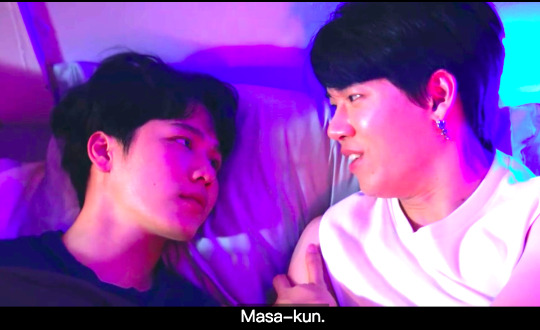
Hia = hyung/oppa (it may be used by a younger male or female but is only use on an older male) and specifically ties to Chinese heritage.
Jie/jay = noona/unni (it may be used by a younger male or female but is only use on an older female) and specifically ties Chinese heritage. It has also been coopted by the queer community and may be translated as “sis” under those circumstances. More about hia here.
Khun = -ssi or -san, and is a gender neutral formal address. It can be a title Khun + Name (first or last), an I/you pronoun, and also a proper name (ya, know, just for s&gs). Also in families that are more formal it is a mode of polite address for parents, Khun Maa for mother, Khun Paa for father.
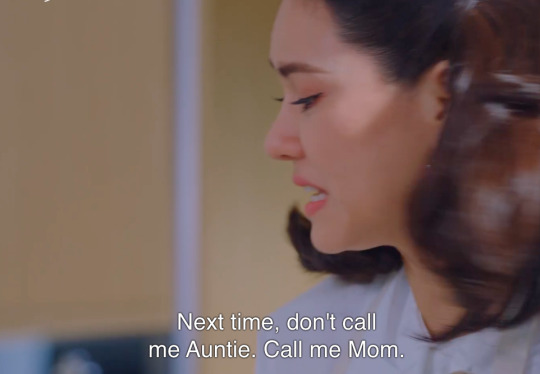
Vietnamese Honorifics
Vietnamese honorifics and modes of address are not my bailiwick but the amazing @squeakygeeky has been blogging a series around VBL linguistics and it’s queer struggles with pronouns because of bifurcation around gender.
Oh boy was this a lot. And I am sorry to @timelesstoothfairy who originally asked this question, I don’t think they realized what a can of worms it opened up.
Language, how is it SO MUCH FUN?
(source)
472 notes
·
View notes
Text
I really think Rasputin lucked out, in that being remembered by history as some species of giant unkillable sex wizard is something most of us can only fruitlessly aspire to.
163K notes
·
View notes
Text
guys have you read this manga
(sorry for bad quality)

if not what are you even doing
its called "My Son is Probably Gay" (alternative titles include Uchi no Musuko wa Tabun Gei, うちの息子はたぶんゲイ)
it's abt the relationship between a mom and her son who tries his hardest of not being the adorable obvious fool he is having crushes on boys
consider:
absolutely adorable style (especially the mom omg just look at her)
very new manga, started in Sep 2019 I think? a lot of room for updates in the future!
a mother being so absolutely loving of his son she appreciates everything he tells her and instead of growing up in society's mold of what a "man" is, she wants him to express himself and embrace everything he holds dear to his heart
ohngmy god she is who i aspire to b e
here are two snippets of the series!!

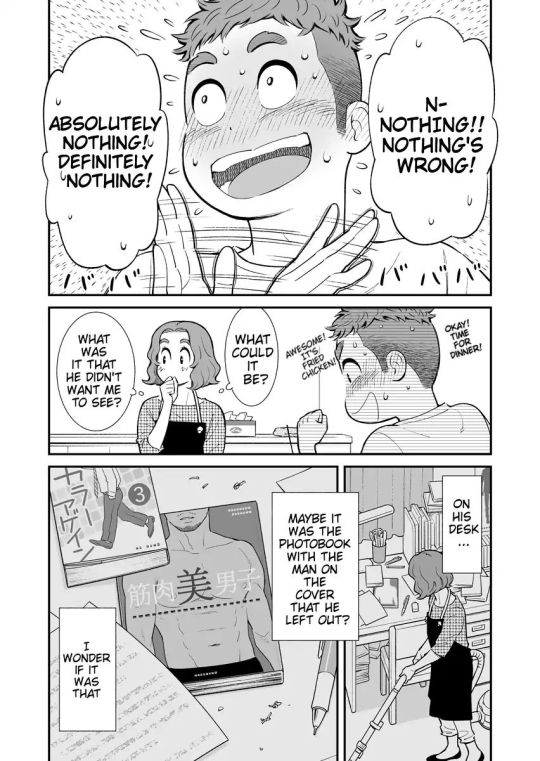

---
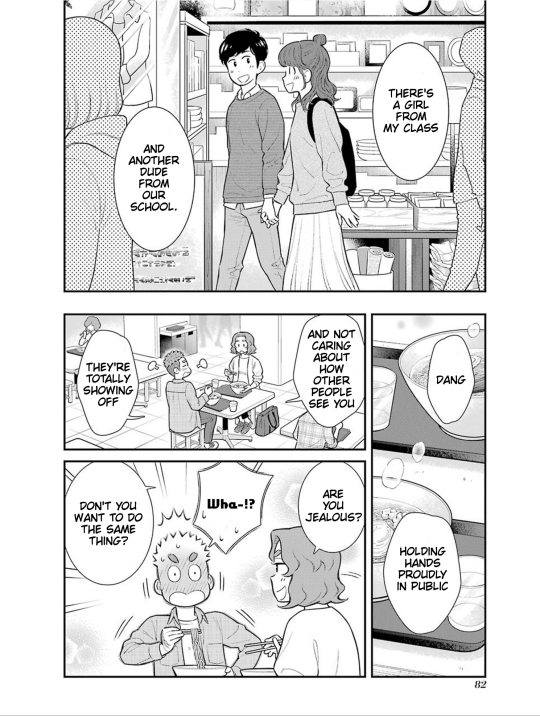
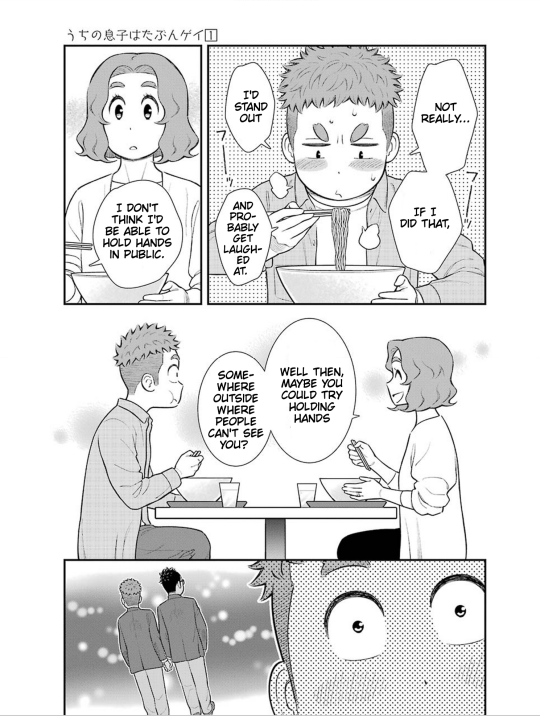
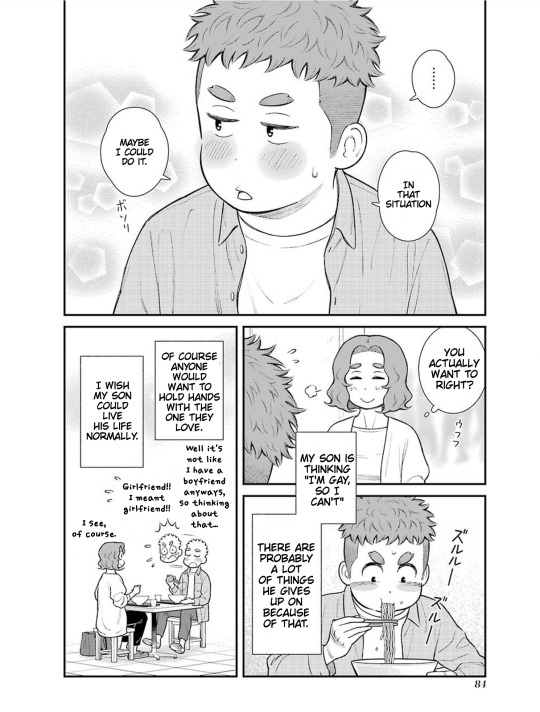
please support the artist (Okura)!!
72K notes
·
View notes
Text
There are a couple of things about current shipping culture that confuse me.
1. The focus on whether or not a pairing will become canon as a reason people should ship something or not. Do you not understand what the “transformative” part of “transformative works” means?”
2. This idea that saying “I ship that” means “I think that, as presented in canon,this is a perfect, healthy relationship that everyone should model their relationship after.”
Sometimes shipping something does mean that. Sometimes shipping something means “Person A is a trash bag who doesn’t deserve person B but I would love to explore how Person A might grow to deserve Person B.” Sometimes it means “I want these characters to live together forever in a conflict free domestic AU.” Sometimes it means “I want Person A to forever pine after Person B. Nothing is beautiful and everything hurts.” And sometimes it just means you like their faces and want to see Person A and Person B bone in various configurations and universes.
157K notes
·
View notes
Text
hot artists don't gatekeep
I've been resource gathering for YEARS so now I am going to share my dragons hoard
Floorplanner. Design and furnish a house for you to use for having a consistent background in your comic or anything! Free, you need an account, easy to use, and you can save multiple houses.
Comparing Heights. Input the heights of characters to see what the different is between them. Great for keeping consistency. Free.
Magma. Draw online with friends in real time. Great for practice or hanging out. Free, paid plan available, account preferred.
Smithsonian Open Access. Loads of free images. Free.
SketchDaily. Lots of pose references, massive library, is set on a timer so you can practice quick figure drawing. Free.
SculptGL. A sculpting tool which I am yet to master, but you should be able to make whatever 3d object you like with it. free.
Pexels. Free stock images. And the search engine is actually pretty good at pulling up what you want.
Figurosity. Great pose references, diverse body types, lots of "how to draw" videos directly on the site, the models are 3d and you can rotate the angle, but you can't make custom poses or edit body proportions. Free, account option, paid plans available.
Line of Action. More drawing references, this one also has a focus on expressions, hands/feet, animals, landscapes. Free.
Animal Photo. You pose a 3d skull model and select an animal species, and they give you a bunch of photo references for that animal at that angle. Super handy. Free.
Height Weight Chart. You ever see an OC listed as having a certain weight but then they look Wildly different than the number suggests? Well here's a site to avoid that! It shows real people at different weights and heights to give you a better idea of what these abstract numbers all look like. Free to use.
162K notes
·
View notes
Text
the historical source we have for understanding much of the early roman empire are so fucking bad. like whenever you hear any insane story about tiberius/caligula/nero/commodus/elagabalus imagine trying to put together an account of any modern figure if your only avaiable sources were tucker carlson archives and the daily mail
4K notes
·
View notes
Text
35K notes
·
View notes
Photo
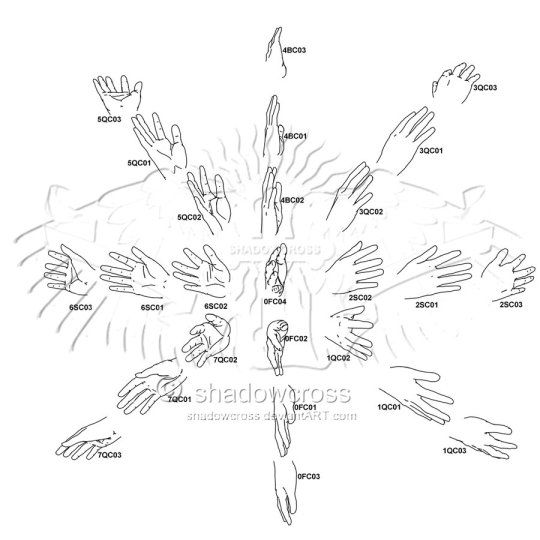
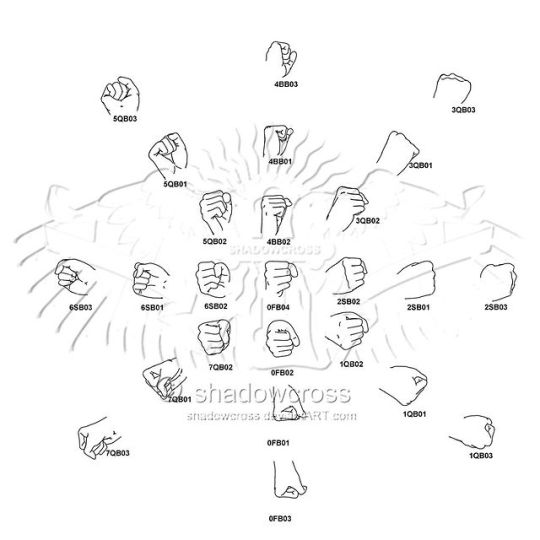


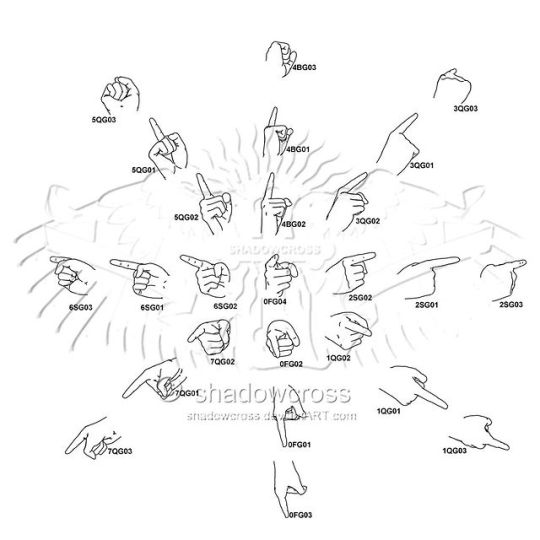
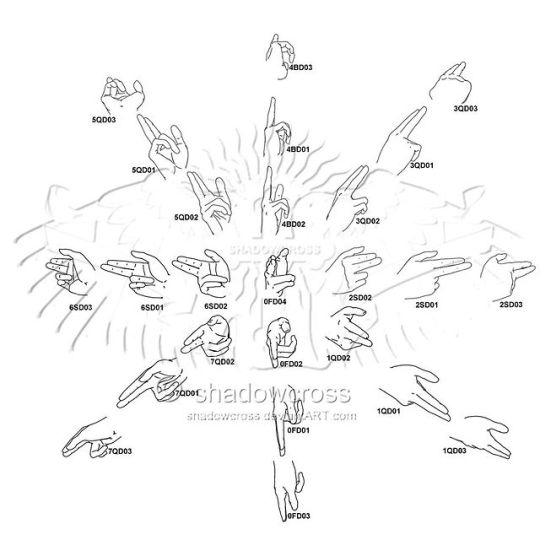
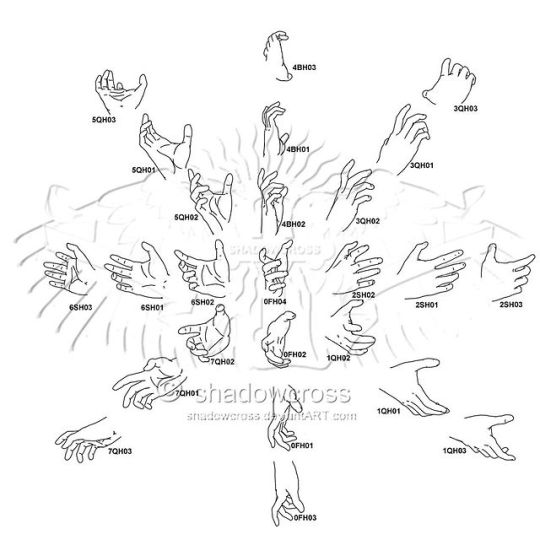

A mouth-watering fuck-ton of hand angle references.
By Shadowcross on DA.
247K notes
·
View notes
Text

A little fast sketch of Andy Wu as Bai Lang in „My tooth your love“ aka the Taiwanese BL that got me in its clutches. And yes the first kiss takes place in a dentist chair. Why you may ask? Narratively it makes a lot of sense.
2 notes
·
View notes
Text

60K notes
·
View notes
Text


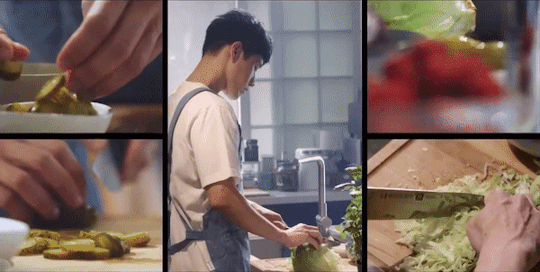

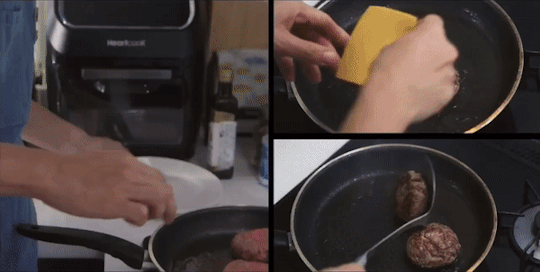

My Tooth Your Love: Cooking Montage #1
#my tooth your love#bai lang#the apron#i need it for art reasons#my new dnd character is very much inspired by bai lang#he is a cook
66 notes
·
View notes
Text
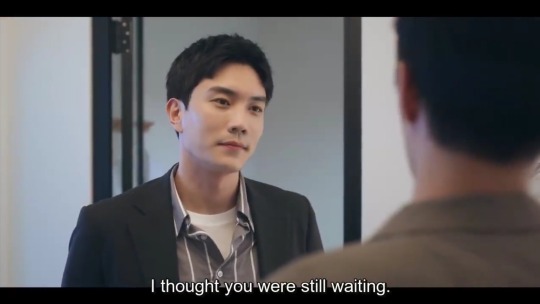


Me:

100 notes
·
View notes
Text
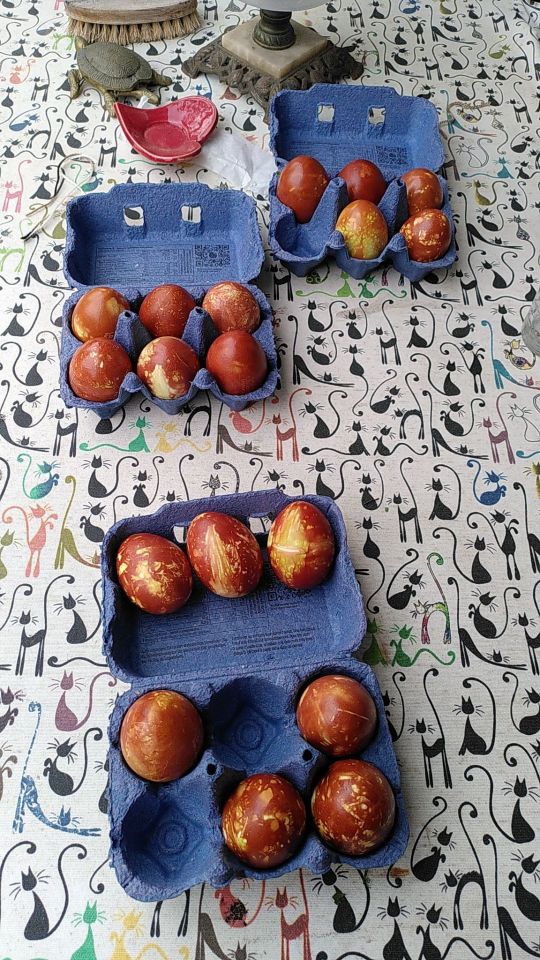

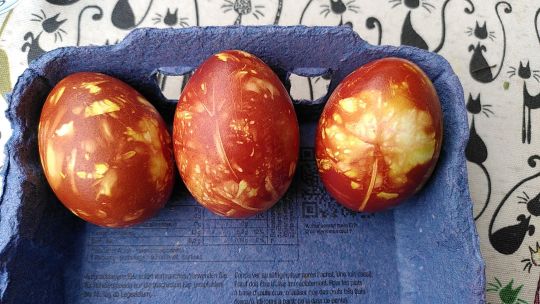
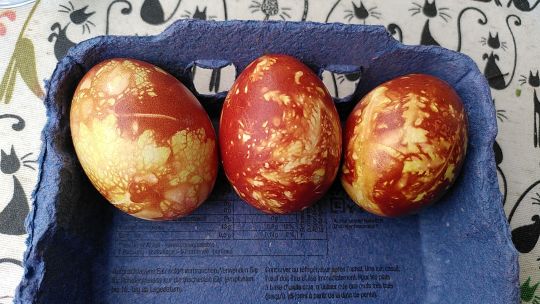
Obligatory egg colouring post. Agrippa's been collecting herbs with her parents and then colouring them with onion shells (probably not the right word but to tired to check).
Happy holidays, enjoy your free time if you celebrate.
#eggs#easter#happy holidays for those who celebrate#agrippa's very specific family traditions#egg colouring
2 notes
·
View notes
Text
you guys wanna see the most accurate and blasphemous representation of the words ‘catholic shaming’?
163K notes
·
View notes
